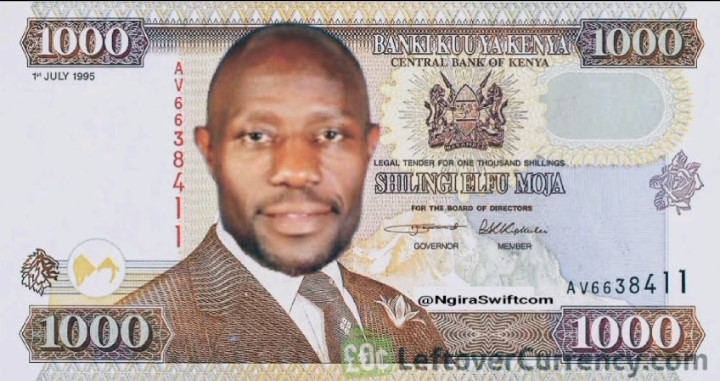A parliamentary aspirant for the Funyula constituency, Rodgers Shem Mukani, has ignited controversy with a campaign video featuring his image superimposed on a Kenyan banknote. Mukani, an accountant at City Hall, used this bold tactic to promote his campaign, projecting his ambition to win the Funyula seat and become a prominent figure in Kenyan politic
His video even incorporates the famous catchphrase “zoea hiyo sauti” (get used to that voice) from Central Organisation of Trade Unions (COTU) Secretary General Francis Atwoli, adding flair to his campaign.
While Mukani’s approach may be attention-grabbing, it has raised questions about potential legal repercussions. Kenyan law takes a strict stance on tampering with currency. According to the Penal Code, defacing, tearing, cutting, or otherwise mutilating currency without authorization is an offence punishable by up to three months in jail, a fine of up to Ksh 2,000, or both. Specifically, altering the appearance of currency with an individual’s likeness, as Mukani did, carries a more substantial fine of Ksh 8,000 or a jail term of six months.
A History of Politicians Using Manipulated Currency for Campaigns
Mukani is not the first Kenyan politician to deploy altered currency in campaign materials. In the 2022 presidential race, Roots Party candidate George Wajackoyah stirred excitement among young voters with a modified Ksh 50 note featuring his image. While this generated a flurry of interest on social media, it also prompted a warning from the Central Bank of Kenya against using manipulated currency in campaigns, emphasizing the penalties associated with defacing national currency.
Campaign Creativity vs. Legal Boundaries
While Mukani’s video may appeal to voters with its creativity, it highlights the tension between innovative campaign strategies and legal restrictions. Campaigns that use national symbols, such as currency, to generate buzz are often memorable but can blur the line between marketing and legality. For Mukani, this video may serve as a risky move that could either propel his political career forward or result in unintended consequences if authorities choose to act.
Mukani’s campaign video reflects a new era of creative electioneering, where digital media and bold visuals are reshaping political messaging. However, as his case shows, candidates must navigate these strategies carefully, balancing their ambition with the legal frameworks designed to protect national symbols.





